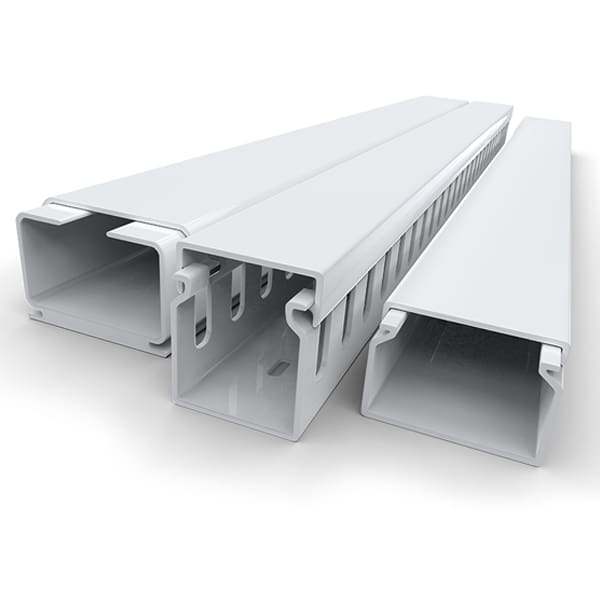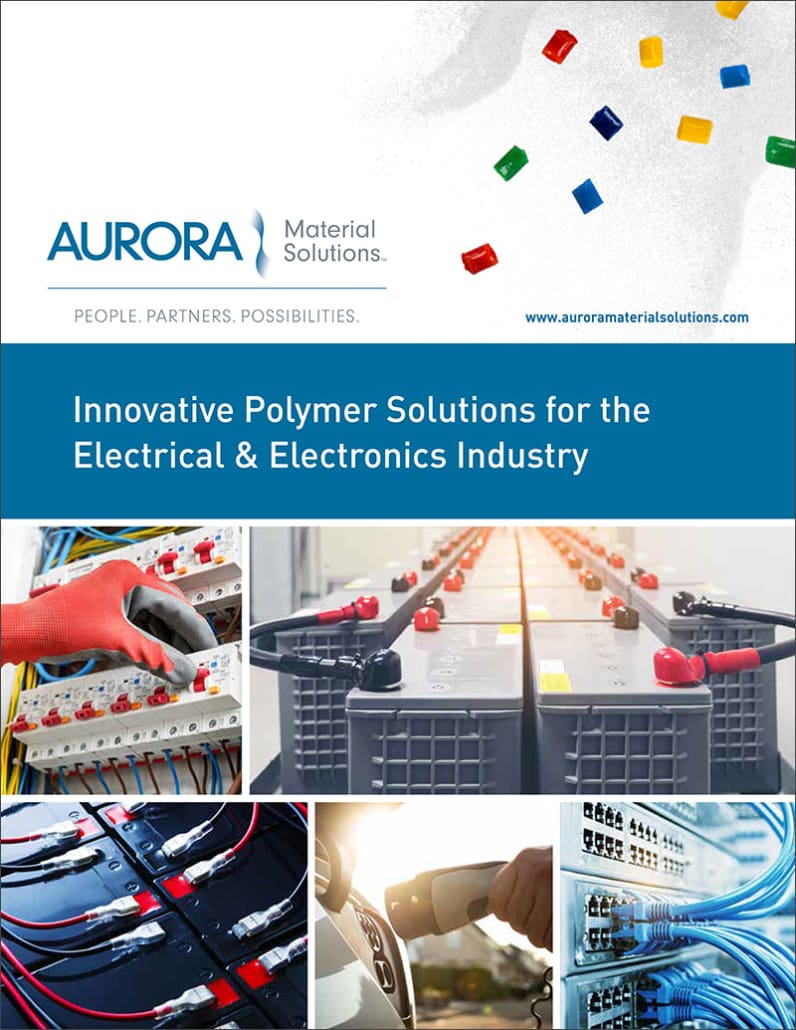Electrical
Aurora Material Solutions offers a variety of solutions for electrical applications.
Our AuroraTec™ line of represents a variety of weatherable and non-weatherable rigid PVC compounds.
- AuroraTec interior grade rigid PVC compounds are UL recognized for electric raceways. Highly versatile, these compounds can be used as stand-alone compounds or as structural substrates, along with capstock, in two-part systems. Either way, these compounds provide a wide processing window and demonstrate resistance to electrical failure far surpassing metal conduits under similar conditions of heat exposure due to their lower thermal conductivity. Designed for the extrusion process, they are available in pellet or powder form in a wide range of colors.
- AuroraTec PC/PBT (polycarbonate/polybutylene terephthalate) compounds are made from alloys of amorphous polycarbonate and the semi-crystalline polybutylene terephthalate resin. They offer excellent chemical resistance, making AuroraTec PC/PBT ideal for electrical connectors located in harsh environments and outdoor connector boxes. These compounds also have high impact and heat resistance, as well as outstanding aesthetic and processability characteristics. AuroraTec PC/PBT has Impact-modified grades that can provide a high level of impact strength at low temperatures. Impact-modified AuroraTec PC/PBT grades can provide a high level of impact strength at low temperature. There are also flame-retardant grades (both non-halogenated and brominated), glass filled grades, and UV (ultra-violet) stabilized grades.
- AuroraTec PC/PET (polycarbonate/polyethylene terephthalate) also offers excellent mechanical, thermal and chemical properties, making it suitable for a wide range of military applications. They are also known for their durability and resistance to chemical, weather and UV exposure, making them suitable for harsh and demanding military environments.
- AuroraTec TPU (thermoplastic polyurethane) composites are thermoplastic elastomers consisting of linear segmented block copolymers composed of hard and soft segments. These TPU grades are fiberglass-reinforced at varying levels. The fiberglass reinforcement offers excellent stiffness and mechanical strength while maintaining excellent abrasion, chemical, and oil and grease resistance, with improved heat resistance over an unreinforced TPU.
Polymers in our AuroraGuard™ family are known for high-heat properties and durability in many applications, these include:
- AuroraGuard CPVC compounds offer many of the same performance and processing benefits of AuroraTec™, but also provide high-heat, low-smoke zero-halogen and flame-retardant properties, ideal for many electrical applications.
- AuroraGuard ABS (acrylonitrile butadiene styrene) combines the strength and rigidity of the acrylonitrile and styrene polymers with the toughness of the polybutadiene rubber, making them a great choice for electronic enclosures and computer keyboards.
- Our AuroraGuard PBT (polybutylene terephthalate) is an engineering polymer that is thermoplastic, semi-crystalline and a type of polyester. PBT provides excellent chemical resistance, shrinks very little during forming, is mechanically strong, heat-resistant up to 150°C (or 200°C with glass-fiber reinforcement). In electrical applications, connector material is made mainly of glass fiber reinforced PBT. It offers performance requirements to UL 94 V0 flame retardance, good strength and toughness, low moisture absorption, electrical and dimensional stability, good surface and luster, and no obvious floating fiber.
- AuroraGuard PC (polycarbonate) compounds are amorphous, thermoplastics that possess outstanding impact strength, excellent colorability, and superior heat resistance with good electrical and thermal properties, low- temperature toughness, and superior dimensional stability. They can be provided unfilled or filled with specialized fillers, mineral or fiberglass reinforcement. PC compounds are available in flame-retardant grades (both non-halogenated and brominated), a wide range of melt viscosities, and can be offered with recyclable PC content and ultraviolet (UV) stabilized grades for outdoor weatherable applications. The polycarbonate (PC) product family complies with FDA (Food and Drug Administration), REACH (Registration, Evaluation, Authorization and Restriction of Chemicals), NSF (National Sanitation Foundation) and UL listed (UL 94).
- AuroraGuard PC/ABS provides impact strength, heat resistance, colorability, very good aesthetics and dimensional stability. These compounds are also available in a recyclable grade series, which are filled with specialized fillers, minerals, or glass. These grades exhibit a superb combination of thermal and mechanical properties, excellent impact strength, high heat resistance, dimensional stability, great processability, flame retardancy, and a wide range of viscosities. AuroraGuard PC/ABS is often used for handheld scanners at checkout counters.
- AuroraGuard PEI (polyetherimide) compounds start from the base resin, amorphous polyetherimide, which is an amber-to-transparent thermoplastic with characteristics similar to the related, much more costly plastic PEEK. Our PEI compounds are inherently flame resistant and provide a high resistance to elevated temperatures and solvents. Compounds within the AuroraGuard™ PEI family provide high mechanical property performance in continuous use environments to 340°F (170°C). Their toughness and rigidity can be further enhanced with fiberglass reinforcement.
- AuroraGuard TPOs (thermoplastic polyolefins) are multiphase compositions in which one phase consists of a material that is hard at room temperature and fluid when heated, and the other phase consists of an elastomeric material that is soft and rubberlike at room temperature. These compounds are used primarily as flame-retardant, polyethylene-based in the wire and cable market; flame-retardant, polypropylene for the battery market (UL 94 V0 & V2); and interior, exterior and paintable applications for the automotive market.
- CPE (chlorinated polyethylene elastomer) alloys are a more economical solution that don’t have to sacrifice performance for a lower price point. CPE is produced by chlorination of polyethylene, with chlorine content ranging from 15 to 30% by weight. CPE has excellent physical and mechanical properties, such as resistance to oils, chemicals, and improved thermal properties. CPE polymers can also exhibit better compression sets, flame retardancy, tensile strength, and abrasion resistance, and can range from rigid thermoplastics to flexible elastomers, making them highly versatile. CPE blends well with many types of plastics, including polyethylene, EVA, and PVC. Such blends can be formed into wire and cable compounds with good dimensional stability without the need for vulcanization. The excellent additive/filler acceptability characteristics of CPE can provide a benefit in blends where compound performance and economics are critical.
AuroraFlex™ flexible PVC is a cost-effective alternative to our thermoplastic elastomers. These compounds provide flexible PVC from 35A to 95A Shore A durometer* to semi-rigid, with specific gravities ranging from 1.15 to 1.65. We use various types of compound additives to promote plasticity and flexibility to meet specific needs, such as renewable non-phthalate, improved low temperature tolerance and biocides. When you’re looking for a compound that offers high-abrasion resistance and excellent processing properties, AuroraFlex SL is designed to produce longer-lasting materials, with no tearing.
Unlike rigid PVC, AuroraFlex SBS and SEBS compounds utilize multiple TPE/TPR chemistries to impart high-performance properties for durability and easy processing. TPE options are available as low as 10A* up to 50D durometer hardness. Some of our TPEs are offered in clear, as well as oil free grades.
Our compounds are developed by a professional R&D staff with decades of formulating experience. Our team will work with you to determine the exact formulation to best meets your needs.
* NOTE: Durometer hardness is measured with a calibrated durometer using the Shore Type-A scale in a room of consistent temperature. The indenter is inserted for 15 seconds to determine if it passes the ASTM D2240-Durometer Hardness test for the desired durometer.
Aurora Material Solutions electrical application brands
Aurora Material Solutions electrical application materials
- ABS
- Clear TPE and FPVC
- Composite Technology
- Concentrates (Flame Retardant)
- CPE Alloys
- CPVC Compounds
- Flexible PVC
- Low-Smoke Zero Halogen Compounds
- PBT
- PC
- PC/ABS Alloys
- PC/PBT Alloys
- PC/PET Alloys
- PEI
- Rigid PVC
- Rigid PVC Clear
- SBS and SEBS Compounds
- TPE: Thermoplastic Elastomers
- TPO: Thermoplastic Olefins
- TPR: Thermoplastic Rubber


